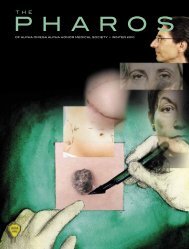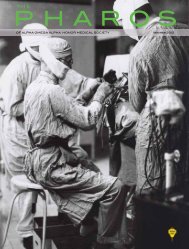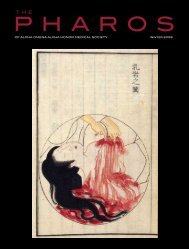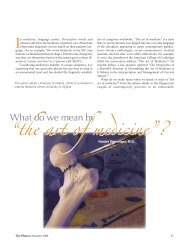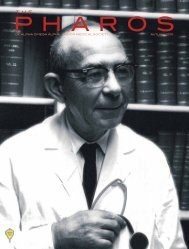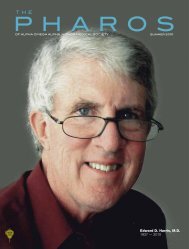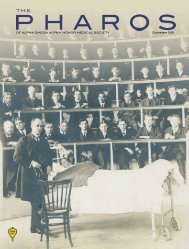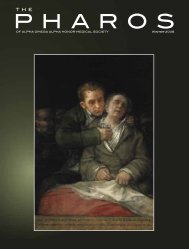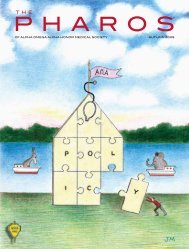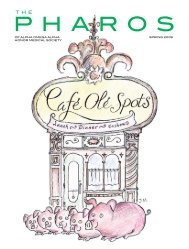The Pharos - Alpha Omega Alpha
The Pharos - Alpha Omega Alpha
The Pharos - Alpha Omega Alpha
You also want an ePaper? Increase the reach of your titles
YUMPU automatically turns print PDFs into web optimized ePapers that Google loves.
Reviews and reflections<br />
contemporary medicine.<br />
A number of superb post-Williams<br />
poets (e.g., Drs. Robert Coles and<br />
John Stone) established themselves in<br />
the 1970s, but it was only in the late<br />
1980s and 1990s that doctor poets began<br />
springing up like wildflowers in an<br />
Alpine meadow. By now they blanket<br />
the continent. Why has this phenomenon<br />
occurred? An interesting question,<br />
but one I can’t attempt to answer here.<br />
For whatever reasons, we now have a<br />
whole new cadre of medical “specialists,”<br />
who, for all their differences in focus<br />
and style, bring a medical sensibility<br />
to their ancient art. A number of recent<br />
anthologies celebrate this burgeoning<br />
poetic movement. 1–5 For this review I’ve<br />
selected a handful of books published<br />
in the last few years just to suggest the<br />
range of contemporary physician-poets.<br />
Secret Wounds<br />
Richard M. Berlin<br />
BkMk Press, University of Missouri—<br />
Kansas City, Kansas City, Missouri,<br />
2011<br />
Psychiatrist Richard Berlin’s Secret<br />
Wounds, which won the John Ciardi<br />
Prize for Poetry in 2011, acknowledges<br />
the woundedness of a medical life, while<br />
affirming the possibility of healing. In<br />
“How a Psychiatrist Writes a Poem,” Dr.<br />
Berlin relates his method:<br />
I begin by remembering<br />
my hours as a patient<br />
and Freud’s “Fundamental Rule”:<br />
Say Whatever Comes to Mind p18<br />
In “Wounds,” he shows that he understands<br />
that “Each wound contains/<br />
its own beauty” and “speaks/its own<br />
language.” p38<br />
In an accessible narrative style,<br />
Berlin discovers revelatory moments in<br />
his life, from the drudgery of internship<br />
(“Interned”) to a seemingly rash act with<br />
a dialysis patient: “It was a headlong act<br />
of love/when I kissed her.” p23<br />
“Medical Education” summarizes the<br />
irony of our curriculum,<br />
What they taught<br />
in school was not<br />
what we needed<br />
and what we needed<br />
(they said)<br />
could not be conveyed. p31<br />
In “Whores” the poet turns his ironic<br />
eye toward health insurance.<br />
But every month,<br />
when we devour<br />
another round<br />
of sessions,<br />
I fill out forms<br />
for insurance pimps<br />
who won’t pay<br />
unless I reveal<br />
the private parts. p66<br />
Richard Berlin transforms the wounds<br />
of a life in medicine, a life on the line,<br />
so to speak, into affirmation, not with<br />
fancy language or heroic gestures, but<br />
with the eloquence of directness and<br />
honesty.<br />
Poems from Both Sides of the<br />
Fence: A Disabled Physician’s<br />
Experiences in Medicine<br />
Beryl Lawn<br />
Texas Review Press, Huntsville, Texas,<br />
2011<br />
Another psychiatrist, Beryl Lawn,<br />
writes from the perspective of a<br />
physician whose wounds are not so secret.<br />
Paraplegic as a result of a childhood<br />
accident, Dr. Lawn, in Poems from Both<br />
Sides of the Fence, offers tough wisdom<br />
from the perspective of both patient and<br />
healer. Unlike Richard Berlin’s poems,<br />
Dr. Lawn’s are very short, explicit, anecdotal,<br />
and sometimes gnomic. <strong>The</strong>y<br />
resemble clinical “pearls.” Far from being<br />
limited by her seeming disability, the<br />
poet proclaims,<br />
I believe<br />
I am<br />
set free<br />
by my wheelchair. p5<br />
In one poem she reveals the secret of<br />
generating patient satisfaction:<br />
For the patient<br />
it was<br />
time spent,<br />
attention given<br />
(not experience)<br />
for which<br />
he was most<br />
grateful. p17<br />
40 <strong>The</strong> <strong>Pharos</strong>/Autumn 2012



